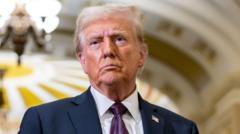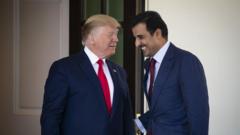The U.S. Supreme Court has dismissed former President Donald Trump's urgent request to postpone his upcoming sentencing related to a hush-money case, emphasizing public interest and minimal burden on his part.
Supreme Court Denies Trump's Attempt to Delay Sentencing in Hush-Money Case

Supreme Court Denies Trump's Attempt to Delay Sentencing in Hush-Money Case
Supreme Court's 5-4 decision allows Trump's sentencing to proceed, focusing on his falsification of financial records.
In a key ruling, the Supreme Court has denied Donald Trump's appeal to delay his sentencing scheduled for this Friday in connection with his hush-money scandal. The court's 5-4 decision comes after Trump sought a determination on whether he was entitled to an automatic stay due to his position as president-elect. However, the justices decided against it, citing that Trump's legal concerns could be adequately addressed through the appeals process and deemed the burden of attending the sentencing "insubstantial."
The situation emerged from a criminal case where Trump was found guilty of falsifying records to hide reimbursements for a $130,000 payment to adult film actress Stormy Daniels, which was disguised as legal expenses in 2016. Judge Juan Merchan, overseeing the case, indicated he might not impose jail time, further complicating Trump's legal battles.
The Supreme Court saw two conservative justices—John Roberts and Amy Coney Barrett—aligning with the court's liberal members to form the majority opinion. Trump's attempts to delay the sentencing had already faced three rejections from lower New York courts, culminating in the Supreme Court's final decision to allow the legal proceedings to unfold as planned.
Trump’s legal team argued for a stay, positing that the potential injustice to the presidency warranted intervention. Yet this stance was countered by Manhattan prosecutors, who emphasized the pressing public interest in moving forward with the sentencing and asserted that Trump's claims of presidential immunity had no robust legal foundation.
Despite previous Supreme Court rulings favoring Trump regarding presidential immunity relating to official actions, prosecutors noted that immunity claims do not extend to the period before an individual assumes office. A coalition of former public officials and legal scholars also supported the prosecution in an amicus brief, urging the court to dismiss Trump’s efforts to evade accountability.
As the clock ticks down to Trump's sentencing, the legal landscape remains complex and contentious, highlighting the ongoing intersection of legal and political theatre in America.
The situation emerged from a criminal case where Trump was found guilty of falsifying records to hide reimbursements for a $130,000 payment to adult film actress Stormy Daniels, which was disguised as legal expenses in 2016. Judge Juan Merchan, overseeing the case, indicated he might not impose jail time, further complicating Trump's legal battles.
The Supreme Court saw two conservative justices—John Roberts and Amy Coney Barrett—aligning with the court's liberal members to form the majority opinion. Trump's attempts to delay the sentencing had already faced three rejections from lower New York courts, culminating in the Supreme Court's final decision to allow the legal proceedings to unfold as planned.
Trump’s legal team argued for a stay, positing that the potential injustice to the presidency warranted intervention. Yet this stance was countered by Manhattan prosecutors, who emphasized the pressing public interest in moving forward with the sentencing and asserted that Trump's claims of presidential immunity had no robust legal foundation.
Despite previous Supreme Court rulings favoring Trump regarding presidential immunity relating to official actions, prosecutors noted that immunity claims do not extend to the period before an individual assumes office. A coalition of former public officials and legal scholars also supported the prosecution in an amicus brief, urging the court to dismiss Trump’s efforts to evade accountability.
As the clock ticks down to Trump's sentencing, the legal landscape remains complex and contentious, highlighting the ongoing intersection of legal and political theatre in America.






















